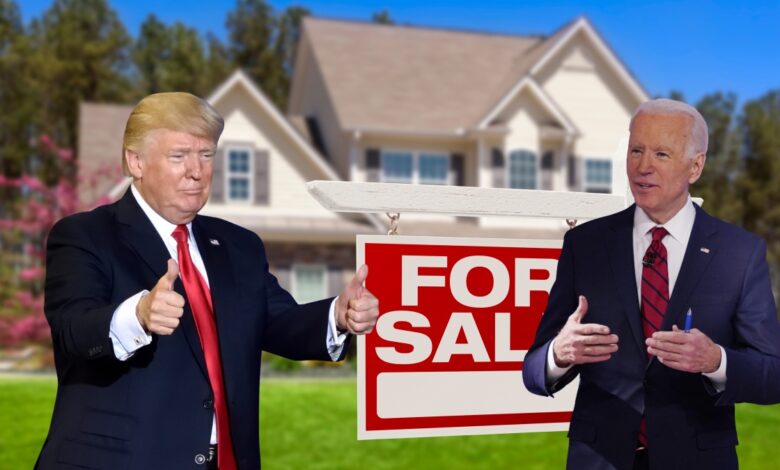Why the Housing Market Could Influence Swing State Voters in the 2024 Election
Fluctuating home values could sway voters in these key swing states, according to the new "Housing Performance and the Electorate" study.

As the 2024 presidential election approaches, an intriguing factor has emerged as a potential influence on voter behavior: housing prices.
A new study, “Housing Performance and the Electorate,” has shed light on how fluctuations in home values may sway voters, particularly in key swing states.
The study, conducted by academics Eren Cifci, Alan Tidwell, J. Sherwood Clements, and Andres Jauregui, analyzed county-level housing market performance and voting patterns over six presidential elections from 2000 to 2020.
Implications for the 2024 Election
Their findings suggest a strong correlation between rising home prices and support for the incumbent party, while stagnant or declining home values tend to favor the challenging party.
For many voters, their home is their most significant asset. University of Alabama Associate Professor Alan Tidwell explained, stating:
“People feel more financially wealthy if they have a lot of housing equity. How financially wealthy they feel really impacts their sense of financial and economic well-being.”
This sentiment can translate into political support for the incumbent if home prices have risen, making homeowners feel more secure and prosperous.
The impact of home prices is most pronounced in swing counties, where voters have a history of switching party preference. The study found that in these counties, a 1% increase in home values over the four years preceding an election increased the likelihood of voting for the incumbent party by 0.36%. Conversely, a decline or slower growth in home prices made these counties more likely to support the challenging party.
This trend is a national extension of the “homevoter hypothesis,” a concept introduced by William A. Fischel in 2001. The hypothesis posits that homeowners tend to vote for policies and candidates they believe will boost their property values. While this behavior has been well-documented in local elections, the recent study provides evidence that it also holds true at the national level.
Fischel, now retired from Dartmouth College, was surprised by the study’s findings. “I was really quite surprised at the strength of the evidence,” he said. “How did they find such a strong mechanism? But I have no reason to doubt their evidence.” This underscores the broader economic context in which national elections take place, where housing equity plays a significant role in shaping voters’ perceptions of their financial well-being.
Swing States and Swing Counties
In the lead-up to the 2024 election, housing market dynamics could be pivotal in key swing states, such as Arizona, Georgia, Michigan, Nevada, North Carolina, Pennsylvania, and Wisconsin.
Nationally, home prices have risen rapidly, with a 46.4% increase from March 2020 to March 2024, according to the Freddie Mac Home Price Index. Swing states like North Carolina, Arizona, Georgia, and Wisconsin have seen even higher gains, exceeding 50%.
Swing counties, which account for 23% of all U.S. counties and have switched party votes at least once since 2000, are crucial in determining election outcomes. In these counties, a 1% increase in home values over the four years preceding an election correlates with a 0.36% increase in the likelihood of voting for the incumbent party. Moreover, each 1% rise in home prices makes a county 0.19% more likely to flip its vote to the incumbent party’s candidate.
Tidwell elaborates, “The larger the return on home values, the more likely you are to vote for the incumbent, or to flip for the incumbent. For every percent of positive return, there is a percentage increase in voting for the incumbent.”
While this trend might seem to favor the incumbent, President Joe Biden, the study’s authors caution that many factors influence voter behavior.
“It’s just one of many factors,” Tidwell noted. “It’s not really a forecast on its own.”
Despite the rising home prices, the housing market’s affordability crisis remains a critical issue. Many buyers and renters face significant challenges due to high mortgage rates and a shortage of homes.
Redfin Chief Economist Daryl Fairweather highlighted the fact that dissatisfaction with housing affordability could sway voters against the incumbent, stating:
“High interest rates make it unaffordable for renters to become first-time homeowners, or for homeowners to upgrade to a more expensive home. The state of the housing market could be a minus for Biden.”
Trump v Biden
Republican candidates have seized on this issue, criticizing Biden for the surge in home prices. Senator Tim Scott, a staunch supporter of Donald Trump, remarked on social media that “under President Biden, home prices have risen almost 50%, making it nearly impossible for millennials to buy their first home and driving the American Dream further and further out of reach.”
However, it’s important to note that most voters are already homeowners. Rising home prices have increased their equity and household net worth, potentially benefiting the incumbent.
According to his observations, Tidwell said:
“When you go to the grocery store or restaurant or the gas pump, I think maybe people feel a little bit different pain than if they own a house and they see their house price going up.”
Ultimately, the housing market’s influence on the 2024 election highlights the complex interplay of economic factors in voter decision-making. While rising home prices may benefit the incumbent in swing states, the broader affordability crisis could also drive voters to consider alternative candidates promising relief.
As the election approaches, both parties will need to address these housing-related concerns to sway the crucial swing state voters.
Read Next: Trump Found Guilty: Next Moves and 2024 Election Implications
Join the Discussion in the WVC Facebook Investor Group
Have a Stock Tip or New Story Suggestion? Email us at Invest@WealthyVC.com




